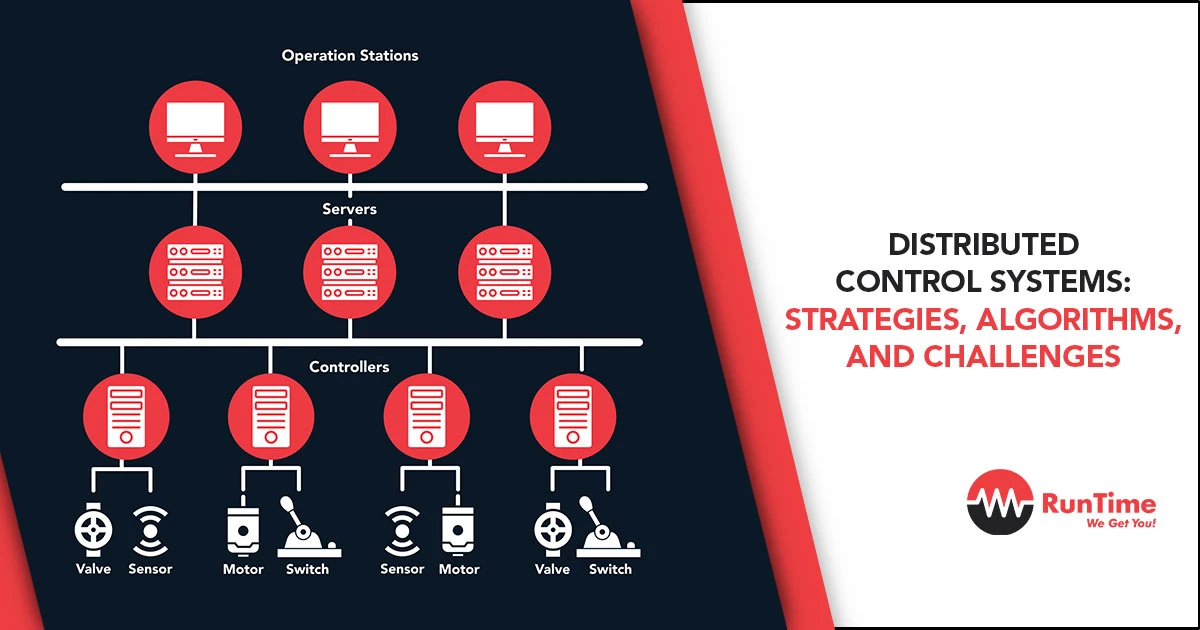Distributed Control Systems (DCS) play a crucial role in various industries, including medical, transport, industrial automation, audio/video, agriculture, energy, telecommunications, aerospace, and the Internet of Things (IoT). These systems are essential for monitoring and controlling production processes, optimizing functionality and performance, and ensuring efficient task execution in real-time operating systems.
Let’s explore distributed control systems (DCS), including their architecture, components, applications, benefits, and limitations. We will also discuss implementation, integration, training, maintenance, and troubleshooting. Whether you are a control systems engineer or a manager overseeing these systems, this guide will equip you with the necessary insights and knowledge to master DCS effectively. Let’s dive in and enhance your understanding and skills in this critical field!
What is a Distributed Control System?
A distributed control system consists of three main components: field devices, controllers, and operator stations. Field devices, such as sensors and actuators, gather data from the production process and send it to the controllers. The controllers process the data and send commands to the field devices to control the process. Operator stations provide a user interface for operators to monitor and interact with the system.
Key Benefits of DCS
- Integration with existing systems, allowing for seamless integration and enhanced functionality
- Efficient task execution and real-time operation
- Complements existing infrastructure and meets industry requirements
Applications of DCS
Process Industries
In process industries, DCS is used to monitor and control various processes, such as chemical production and refining, ensuring optimal performance and efficiency.
Power Generation and Distribution
In power generation and distribution, DCS helps in managing and controlling power generation, transmission, and distribution systems.
Water and Wastewater Treatment
In water and wastewater treatment, DCS plays a vital role in ensuring the quality and efficiency of water treatment processes.
Benefits and Limitations of Distributed Control Systems
One of the key benefits of distributed control systems is their ability to provide real-time monitoring and control of production processes. This enables operators to make informed decisions and respond quickly to changes in the process. Additionally, DCS allows for the integration of different systems, such as supervisory control and data acquisition (SCADA), enterprise resource planning (ERP), and manufacturing execution systems (MES), creating a more interconnected and efficient operation.
However, distributed control systems also have limitations. They can be complex to design, implement, and maintain, requiring skilled engineers and robust planning. Additionally, the cost of implementing a DCS can be higher compared to traditional control systems. Despite these challenges, the benefits of improved process control, scalability, and fault tolerance make distributed control systems a valuable tool for industries.
Distributed Control Systems: Components and Architecture
Distributed control systems (DCS) play a crucial role in various industries, including medical, transport, industrial automation, audio/video, agriculture, energy, telecommunications, aerospace, and the Internet of Things (IoT). These systems consist of a network of interconnected controllers, computers, and other automation devices that monitor and control production processes.
Components of Distributed Control Systems
- Field devices: Sensors and actuators that collect data from the production process and transmit it to the controllers.
- Controllers: Process the data received from field devices and generate control signals for the field devices.
- Communication networks: Facilitate the exchange of data between the controllers and operator stations.
- Operator stations: Provide a user interface for operators to monitor and control the system.
Architecture of Distributed Control Systems
The architecture of distributed control systems is designed to be scalable, flexible, and reliable. It typically consists of multiple levels:
- Field level: Field devices collect data and perform basic control functions.
- Control level: Controllers process data and generate control signals.
- Supervisory level: Operator stations provide a graphical user interface for operators to monitor and control the system.
Implementing and Maintaining a Distributed Control System
Implementing and maintaining a distributed control system requires careful planning and design. Consider the following factors:
- System requirements: Determine the specific needs and goals of the system.
- Communication protocols: Select appropriate protocols for data exchange.
- Data security: Ensure the security of data transmitted within the system.
- Integration with existing systems: Integrate the DCS with legacy control systems or enterprise resource planning (ERP) systems if necessary.
- Training and support: Provide training and support for DCS operators to ensure efficient system operation.
- Maintenance and troubleshooting: Regularly maintain and troubleshoot the system to keep it running smoothly.
Strategies for Implementing and Maintaining a Distributed Control System (DCS)
Implementing and maintaining a distributed control system (DCS) requires careful planning and strategic approaches.
Comprehensive Planning and Design
One key strategy is to start with a comprehensive planning and design phase. This involves clearly defining the goals and objectives of the DCS implementation, as well as identifying the specific requirements of the system. By thoroughly understanding the needs of the organization and the processes that the DCS will be controlling, engineers can develop a solid foundation for the implementation.
Integration with Existing Systems
Another important aspect of implementing a DCS is integration with existing systems. This can involve integrating the DCS with other control systems, data acquisition systems, and even enterprise resource planning (ERP) systems. By ensuring seamless integration, engineers can optimize the functionality and efficiency of the overall control system.
Training and Support for Operators
Training and support for DCS operators is crucial for successful implementation and maintenance. Providing comprehensive training programs that cover both the technical aspects of the DCS as well as the specific processes and procedures of the organization can help operators effectively utilize the system. Ongoing support and troubleshooting resources should also be readily available to address any issues that may arise.
Maintenance and Troubleshooting
Maintenance and troubleshooting of DCS systems is an ongoing process that requires proactive monitoring and regular updates. Engineers should establish a maintenance schedule to perform routine inspections, software updates, and hardware upgrades. This can help prevent system failures and ensure the reliability and longevity of the DCS.
Algorithms for DCS Optimization
In the world of distributed control systems (DCS), optimization is key. These systems, comprised of interconnected controllers, computers, and automation devices, play a crucial role in monitoring and controlling production processes across various industries. To ensure the functionality and performance of DCS, algorithms are employed to optimize their operation.
Control Loop Algorithm
The control loop algorithm is an important algorithm for DCS optimization. It continuously adjusts the control parameters of the system to maintain desired operating conditions. By analyzing feedback from sensors and comparing it to setpoints, the control loop algorithm can make real-time adjustments to ensure optimal performance. This algorithm plays a vital role in maintaining stability and efficiency in DCS.
Scheduling Algorithm
The scheduling algorithm is another algorithm used in DCS optimization. In a DCS, multiple tasks are running concurrently, and the scheduling algorithm determines the order and timing of these tasks. It ensures that critical tasks are prioritized and executed promptly. This algorithm is essential for real-time systems where precise timing and responsiveness are crucial.
Machine Learning Algorithms
Machine learning algorithms can also be used for DCS optimization. These algorithms analyze large amounts of data collected from the system to identify patterns and trends that can lead to improved performance. By continuously learning and adapting, machine learning algorithms optimize the operation of DCS in real time.
It is worth mentioning that the implementation of algorithms for DCS optimization requires careful planning and design. Factors such as system complexity, resource constraints, and real-time requirements need to be taken into consideration. Additionally, algorithms should be regularly evaluated and updated to adapt to changing operating conditions and performance goals.
Distributed Control Systems (DCS) Challenges
Distributed control systems (DCS) are critical in modern industries, providing a network of interconnected controllers, computers, and automation devices that monitor and control production processes. However, these systems also come with their fair share of challenges. Let’s discuss some of the key challenges faced in distributed control systems.
Resource Sharing and Inter-Core Communication
One of the primary challenges in DCS is resource sharing and inter-core communication. As the complexity of systems increases, the efficient utilization of resources becomes crucial. In multicore processors, for example, multiple cores are simultaneously executing tasks, and effective resource sharing is essential to prevent resource contention and ensure smooth operation. Inter-core communication is also critical for tasks that require coordination and synchronization across multiple cores. Addressing these challenges requires the implementation of hardware mechanisms and advanced cooling systems to ensure efficient resource sharing and inter-core communication.
Integration of Different Components and Subsystems
Another challenge in distributed control systems is the integration of different components and subsystems. DCS often involves the integration of various devices, such as sensors, actuators, and controllers, from different manufacturers. These components may use different communication protocols and have varying levels of compatibility. Ensuring seamless integration and communication between these components can be a significant challenge for control systems engineers. It requires careful planning, design, and testing to ensure that all components work together harmoniously.
Cybersecurity
Cybersecurity is another major concern in distributed control systems. As these systems become increasingly interconnected, they are more vulnerable to cyber threats. Unauthorized access, data breaches, and malicious attacks can have severe consequences, including disruption of operations, loss of sensitive data, and even physical harm. Implementing robust security measures, such as encryption, access control, and intrusion detection systems, is crucial to protect distributed control systems from cyber threats.
Scalability and Flexibility
Lastly, scalability and flexibility are challenges often faced in DCS. As industries evolve and expand, control systems must be able to accommodate new processes, equipment, and technologies. Scalability refers to the ability of a system to handle increasing workloads and adapt to changing demands. Flexibility, on the other hand, refers to the system’s ability to accommodate changes in requirements and configurations without significant disruptions. Designing and implementing scalable and flexible distributed control systems requires careful consideration of architecture, communication protocols, and software design.
Distributed Control Systems (DCS) in Various Industries
Distributed control systems (DCS) are crucial in various industries, such as medical, transport, industrial automation, audio/video, agriculture, energy, telecommunications, aerospace, and the Internet of Things (IoT).
These systems play a significant role in monitoring and controlling production processes, optimizing functionality, and improving performance.
Conclusion
Distributed control systems are instrumental in optimizing production processes, improving performance, and ensuring real-time operation in various industries. The integration with existing systems, coupled with proper training and support, enables efficient operation and troubleshooting. The applications of DCS in process industries, power generation and distribution, and water and wastewater treatment highlight its importance in critical sectors.
With the constant advancements in technology, DCS will continue to evolve and play a vital role in driving efficiency and productivity in industries worldwide.
Hire Control Systems Engineers with RunTime
At RunTime, we are dedicated to helping you find the best Control Systems Engineering talent for your recruitment needs. Our team consists of engineers-turned-recruiters who have an extensive network and a focus on quality. By partnering with us, you will have access to great engineering talent that drives innovation and excellence in your projects.
Discover how RunTime has helped 423+ tech companies find highly qualified and talented engineers to enhance their team’s capabilities and achieve strategic goals.
On the other hand, if you’re a control systems engineer looking for new opportunities, RunTime Recruitment’s job site is the perfect place to find job vacancies.









